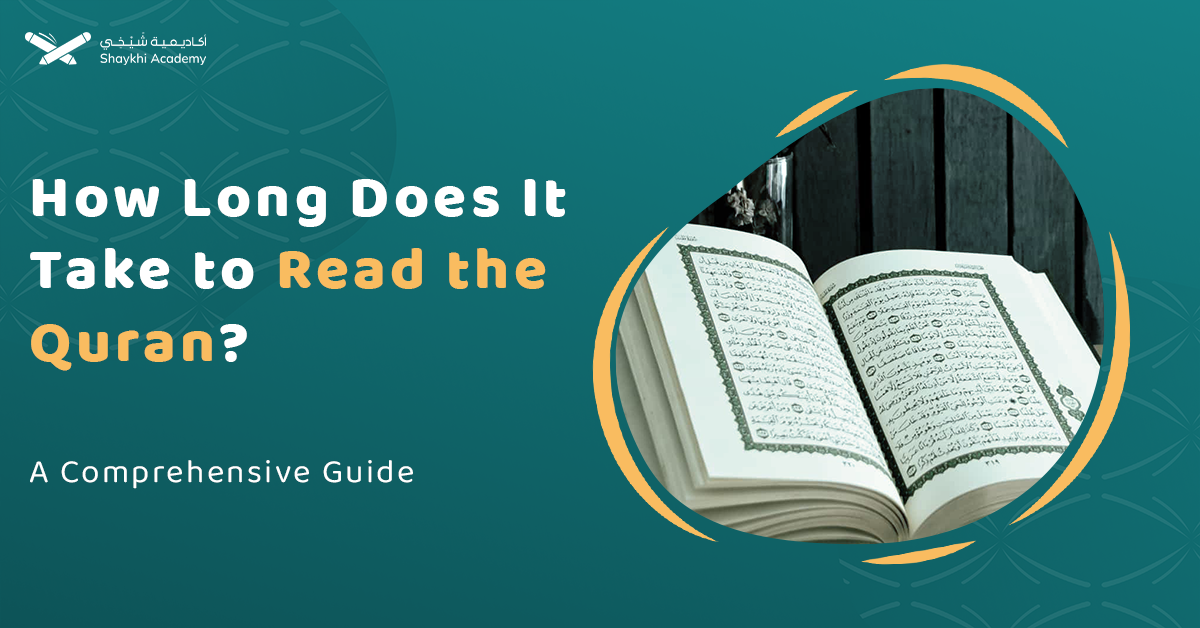Are you interested in Quran learning and curious to know how long does it take to read the Quran? This article answers this question based on the Prophetic tradition and the practices of his companions in dealing with the Quran in their daily lives, as it’s the proper source to refer to for the best results and highly accepted acts of worship. Additionally, the article provides practical tips for non-native Arabs to follow while setting their timeline of recitation or managing their daily wird. Keep reading for deeper insights!
How Long Does It Take To Read The Quran?
Usually, the time beginner non-native Arab students with basic knowledge of tajweed rules and limited familiarity with Arabic vocabulary take to read a page from the Quran is about 15 minutes, focusing only on the sound system and tajweed. Extra time is often suggested for reading the translation. Those with more advanced language skills and tajweed practice need less time.
Still, the time required to read the Quran depends on many factors, such as:
- Arabic level
- Tajweed rules
- Letters’ shapes and pronunciation
- Level of Quran’s effect on the reciter according to his faith level and understanding; he may need to repeat some parts affecting him
- The speed of recitation
Moreover, the Prophet’s variety of advice related to the time for reading the Quran highlights its flexibility and permissibility.
Levels of the Reciters of the Quran affecting the time to read it:
There are various levels of learners dealing with Quran reading, and their reading proficiency and time are influenced accordingly:
- Fluent Arabic Learners: Those fluent in Arabic—both in wording and meaning rules—such as Arabic knowledge seekers and individuals interested in studying the different branches of Arabic.
- Common Arabs: Those who know little of the standard language, such as most of the common native Arabs.
- Non-Natives Studying Arabic: Those with only the basics of Arabic, such as non-native Arabs at the beginning of their journey to learn the language.
- Non-Natives Studying Only Tajweed and Recitation: Those who study letters and tajweed rules but lack understanding of most vocabulary, such as non-native Arabs focused solely on Quran recitation and tajweed.
- Basic Level of Learning Arabic Letters: Those familiar only with letters and pronunciation without applying basic tajweed rules, such as beginners at their initial level of Quran recitation learning.
By understanding these points, one can realize that there is no need to compare themselves with others who have different contexts. This helps maintain healthy motivation for further development in their relationship with the Quran.
How Long Does It Take To Recite The Whole Quran?
One may follow the Prophet’s advice to his companions regarding the timing for reciting the whole Quran. Though not obligatory, these suggestions highlight a goal that Muslims can gradually aim to achieve after reaching a suitable level:
1. Forty Days for the Whole Quran:
The Prophet (PBUH) urged completing the Quran every forty days, saying to Abdullah ibn Amr:
“Recite the Qur’an in forty (days).” (Hasan: At-Tirmidhi 2947)
2. Thirty Days:
In another narration, Prophet Muhammad decreased the time to 30 days when Abdullah told him that he could recite more:
“Recite the whole of the Qur’an during every month.”
3. Twenty Days:
Abdullah continued discussing the matter of completing the Quran, saying, “I find power (to recite it) in a shorter period.” The Prophet (PBUH) then said:
“Then recite it in twenty nights.”
4. Seven Days – The Narrated Prophetic Practice of Recitation:
Finally, when Abdullah asked for a shorter period, the Prophet (PBUH) said:
“Then recite it in seven (nights) and do not exceed beyond it.” (Sahih Muslim)
Prophet Muhammad set this timing and advised Abdullah not to shorten it further, emphasizing that understanding, reflection, and consistency are better than reading in large quantities. Even though Abdullah was a native Arab with great enthusiasm, the Prophet (PBUH) guided him to follow the method he himself practiced.
When the Prophet’s companions were asked about the methodology for dividing the Quran over seven days, they said:
“A third [the first 3 chapters after Al-Fatiha], a fifth [the following five chapters], a seventh, a ninth, an eleventh, a thirteenth, and Hizbul-Mufassal.”
5. Less Than Three Days Is Not Recommended for the Whole Quran:
The Prophet (PBUH) advised against reciting the entire Quran in less than three days, as it could affect understanding and reflection. One may ask: What About the Narrations of Companions or Righteous People Finishing the Quran in Less Than Three Days?
Some scholars have provided explanations for these practices:
- Such individuals reached a professional level that enabled them to recite with understanding and reflection in a very short time.
- Some of these narrations are considered weak.
- The best practice to follow is the method of Prophet Muhammad (PBUH).
- Exceptions to the restriction are made during special times or places of doubled rewards, such as Ramadan and in Mecca.
While it may be challenging for beginners to follow these standards initially, they can achieve them over time. If it remains difficult, one can adhere to the general principles: consistency, even if little, and prioritizing quality over quantity.
How To Make A Good Routine For Quran Wird?
For a good routine in keeping the Quran word (daily portion), one should follow the Prophet’s way in dealing with the Quran and his companions along with some principles to consider:
1. Following Prophet Muhammad’s manner in his Quran Wird ورد
The most important tip for a good routine is what Prophet Muhammad (PBUH) did while reading the Quran since it’s a way of accepting the deed and increasing its reward and effect:
- Slow recitation: Prophet Muhammad’s manner of recitation was described by his wife Hafsa, who said:
“He would recite the sura with a measured slowness so that it would seem to be longer than other suras which were actually longer than it.” (Sahih Muslim) - Separation of Ayat: Additionally, his recitation was characterized by stopping at the end of each verse rather than connecting verses together.
- Usually during prayer: Prophet Muhammad’s recitation of his Quran wird was during voluntary prayers. Still, if you find more concentration with your wird outside prayer, then it’s better for you to keep the higher objective.
For non-native Arabs, it is helpful to use a Quran version with margins containing translations of the meaning. This allows them to prepare for recitation and skim forgotten or unfamiliar parts during the recitation time.
2. Companions’ different styles with their Quran wird
The Prophet’s companions had varied approaches to their wird (regular portion of Quran recitation) based on their individual circumstances, and all were accepted. For example:
- Abu Musa: He used to recite his wird in portions throughout the day. He said:
“I recite it while I am standing, sitting, or riding my riding animals, at intervals and piecemeal.” (Sahih Al-Bukhari) - Mu’adh ibn Jabal: Mu’adh allocated the last part of the night for his wird during his night prayer.
You can choose to complete your wird all at once or divide it throughout the day according to what suits your schedule and circumstances.
3. Keep the range that enables consistency:
Prophet Muhammad directed Muslims to maintain consistency in their actions, saying:
“The acts most pleasing to God are those which are done most continuously, even if they amount to little.” (Bukhari and Muslim)
Thus, one should choose a routine suitable to his situation so that he can easily continue.
4. Set priority for understanding with reflection:
Keeping the meaning of the Quranic message and practicing it is the major objective of revealing the Quran. Keep it in parallel with learning the recitation and keeping the Tajweed rules of the wird.
5. Quality comes first, but quantity is still recognized:
Considering the previous measures of quality does not mean ignoring quantity. Prophet Muhammad (PBUH) himself would read about five portions per day, yet he recited with slow motion, reflection, and consistency. Beginners should prioritize quality while gradually improving their quantity.
6. Intention in reading the Quran is the core:
Lastly, intention governs the entire process of Quran reading. With a sincere intention, one can maintain motivation and receive divine assistance for better and easier results.
Finally, Quran recitation is an essential act of worship that requires patience to bear its fruits over time.
Learn Quran Recitation Today With Shaykhi Academy!
Shaykhi Academy represents a number of courses supported by native Arab tutors for services related to learning Quran recitation, Tajweed rules, Noor al-Bayan for different ages:
- Noorani Qaida course for kids in basics of Quran recitation
- Quran recitation course for adults
- Quran Tajweed course

Conclusion
To conclude, reading the Quran is one of the most highly honorable acts of worship. Thus, to decide how long does it take to read the Quran, we need to refer to the Prophet’s practices and his advice to companions to establish a proper timeline and better routine. Most importantly, remember that reading is a means to achieve the higher objective of following what the Quran teaches. Keep this objective in mind as you set your goals with the Quran!

















































